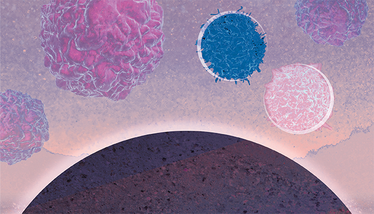
Credit: Cell images within the artwork sourced from AdobeStock.com
AI has been used to reprogram cancer cells, essentially getting them to perform as dendritic cells (DCs) that can identify and help destroy other cancer cells. The work was done by Keck School of Medicine of USC scientists studying glioblastoma, with collaborative efforts from USC and the University of Florida College of Medicine.
Immunotherapy has generated a sea change in cancer treatment, but there has been little impact on patients with glioblastoma because of the challenges of the blood-brain barrier. However, the researchers were able to identify genes that can be reprogrammed to alter the performance of glioblastoma cells. The approach resulted in an up to 75 percent increased chance of survival in mouse models, according to the Cancer Immunology Research study. (1)
Lead author David Tran describes the results as a “groundbreaking” vindication of the power of AI. The process of reprogramming a cell with 20,000 genes comes with a series of extremely complex challenges that would have been almost impossible without AI. Speaking to Keck’s Newsroom, Tran said: “AI is helping us answer some critical questions and gives us a powerful way to learn how to manipulate a cell’s fate. By turning the cancer's own cells against it, we are paving the way for more effective treatments and offering new hope to patients battling this and many other aggressive cancers.”(2)
If animal model tests are deemed safe and effective, an application for approval to begin clinical trials will be filed. It is hoped that AI models will be able to identify genes that can reprogram other types of cancer cells into DCs. However, specificity, fine-tuning, and expansion will be key. Tran says, “We don’t want to give something to a patient that can convert all sorts of cells into DCs … We want to expand the search, using AI to help us find the best possible combinations as we move toward testing in patients.”
- DD Tran et al, “Machine Learning–Directed Conversion of Glioblastoma Cells to Dendritic Cell–like Antigen-Presenting Cells as Cancer Immunotherapy”, Cancer Immunol Res. (2024) DOI: 10.1158/2326-6066.CIR-23-0721
- Z Abrams, “Using AI, USC researchers pioneer a potential new immunotherapy approach for treating glioblastoma”, Keck School of Medicine of USC. (2024). Available at: https://bit.ly/4dxPOb5
Following a Bachelor’s degree in English Literature and a Master’s in Creative Writing, I entered the world of publishing as a proofreader, working my way up to editor. The career so far has taken me to some amazing places, and I’m excited to see where I can go with Texere and The Medicine Maker.



















